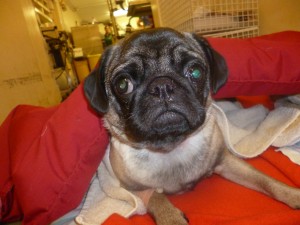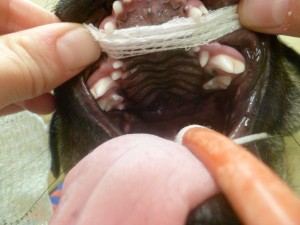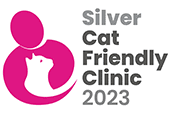Brachycephalic breeds (breeds with a shortened muzzle such as the pug, bulldog and French bulldog) have a compromised respiratory system; due to the shape of the skull and the excess soft tissue within the airway, called brachycephalic obstructive airway syndrome (BOAS). Many owners may be unaware that their dog is suffering from BOAS because the symptoms are seen as ‘normal’ for those breeds.
 Whilst most breeds have open, comma shaped nasal openings, brachycephalics often have narrow, slit-like nostrils, significantly impeding airflow.
Whilst most breeds have open, comma shaped nasal openings, brachycephalics often have narrow, slit-like nostrils, significantly impeding airflow.
The soft palate is a length of muscle fibres at the back of the mouth designed to shut off the airway during swallowing, like a valve, but in bracycephalic breeds, the length is the same as would be seen if their muzzle was the length of a Jack Russell, with the extra soft tissue obstructing the airway. This results in their characteristic snore, but can also lead to exercise intolerance, increased risk of heat stroke, regurgitation and potentially life threatening aspiration pneumonia. 100% of pugs, French Bulldogs and English Bulldogs have an elongated or overlong soft palate, affecting breathing but other breeds, such as the cavalier King Charles and Staffordshire bull terrier may also be affected.
 The soft palate in these breeds is often very thickened, further obstructing the airway and increasing the effort required for air to pass into the lungs. Over time, this increased effort and pressure can further change and damage the airways.
The soft palate in these breeds is often very thickened, further obstructing the airway and increasing the effort required for air to pass into the lungs. Over time, this increased effort and pressure can further change and damage the airways.
Previously, surgery focused just on shortening the soft palate but we are now able to offer surgery to reduce the length and the thickness, whilst also widening the opening of the nostrils under the same anaesthetic, significantly improving airflow, reducing the risk of further detrimental changes to the airway and thereby improving the quality of life of these affected breeds. To maximise the effect, we recommend surgery is performed BEFORE too many of the secondary changes can occur, so typically, at six months or before a year old. It can be performed at the same time as your puppy is neutered if you wish. It is still possible to improve airflow in older dogs but the effect will not be as great once secondary changes have already occurred.
 The surgery involves your dog staying with us overnight for monitoring and going home with pain relief, an antacid medication and a recommendation to feed soft food for 7 days after the surgery due to the presence of stitches within the mouth so it is easier for them to eat. We check each patient 2 and 7-10 days after surgery to make sure they are progressing well but there are no stitches to remove as they are dissolvable. Your dog will need to wear a buster collar for ten days to prevent them from scratching out the stitches in their nose before the tissue has had time to heal.
The surgery involves your dog staying with us overnight for monitoring and going home with pain relief, an antacid medication and a recommendation to feed soft food for 7 days after the surgery due to the presence of stitches within the mouth so it is easier for them to eat. We check each patient 2 and 7-10 days after surgery to make sure they are progressing well but there are no stitches to remove as they are dissolvable. Your dog will need to wear a buster collar for ten days to prevent them from scratching out the stitches in their nose before the tissue has had time to heal.
If you are interested in your dog undergoing this brachycephalic surgery, please book an appointment with our vet so that your dog can be examined, assessed and any specific questions or concerns regarding the surgery can be discussed. If you have an older dog, we would be happy to assess it but if it is suffering from secondary breathing complications, we might deem it more appropriate to refer them to a specialist.
Leo is the dog in the photos and he recently underwent this surgery. This is what his owner had to say……
“Leo was only 7 months old when he had his surgery which was suggested as his nostrils were very restricted and him being a short muzzled breed they can have problems with their soft palate when they get older. He recovered from the surgery within a few days which has helped make his nasal breathing easier, an improvement of up to 70% we were advised. We will see all the benefits of the surgery when he gets older but for now he breathes easier and is less noisy which is also a benefit for us . I would recommend this surgery as it’s helped our little guy now and his quality of life for the future.”
If you have any questions about this subject please leave a comment on our Facebook page

![Leo Happy[1]](https://www.cherrydownvets.co.uk/news/wp-content/uploads/2015/12/Leo-Happy1-977x1024.jpg)




